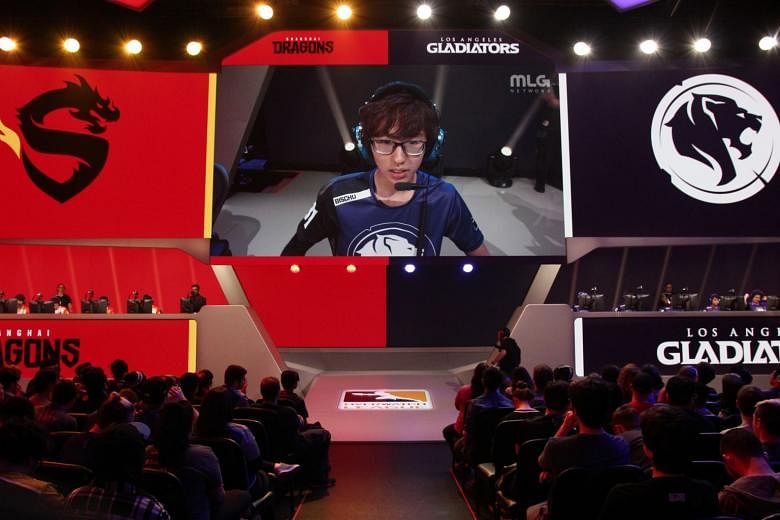ATLANTA • The world is watching. This month's debut of the Overwatch League may settle the question of whether video gaming is a respectable sport, one that has outgrown its juvenile stereotype.
Fans of Overwatch, a hugely popular team-based game released in 2016, could not have hoped for a better start. A reported 10 million people streamed the opening games, when teams from worldwide gathered inside Blizzard Arena in California to play - essentially - an elaborate variation of capture the flag.
A tall, thin 22-year-old named Felix Lengyel controlled a sort of superpowered ape, his speciality character, in one of the most-anticipated match-ups. He helped his team, Dallas Fuel, capture an arena in less than two minutes.
Here was Overwatch at its best.
And then came the worst. Despite the good round, his team lost that game. Then they lost the match, then the next and the next.
By last Thursday, Dallas was 0-3 in the tournament and a frustrated Lengyel did something he is famous for: He got mean. He screamed a profanity at a rival player, who is gay. Then he followed it with a homophobic suggestion.
Last Friday - barely a week after setting a milestone in the history of competitive video games - the Overwatch League suspended and fined one of its top players.
And this, in short, is the eSports dilemma - sophisticated games, often spoilt by players who act worse than children.
Lengyel apologised and his team said he would have to sit out the tournament's first stage.
But it is telling that the player he insulted, Austin "Muma" Wilmot, did not seem surprised that a man he called a "homophobic piece of garbage" was representing Overwatch to the world, playing in the same elite league as himself.
"I really don't care," Wilmot said on his own stream.
Before the league existed, both learnt to play Overwatch exactly like tens of millions of other people: in randomly assigned matches on Blizzard Entertainment's servers, where it is common to hear homophobia, misogyny, racism and naked rage over the voice lines.
Blizzard has tried many times to curtail the problem. And now that it is trying to take Overwatch pro, some wonder how it will keep the poison from spreading.
"These players are young, from 18 to 22, and new to the bright, artificial lights of a corporately owned and operated competitive scene," video-game blog Kotaku noted after Lengyel's suspension.
"This recent string of incidents seems to suggest that everybody - players, organisations and Blizzard - have some growing up to do."
Lengyel's outburst is "part of his Overwatch personality", said Jason Chiu, who streams the game for a living. "I think he would have said it even if the player wasn't homosexual. The community is quite toxic and if the pros are doing it, everyone else feels 'if they can get to that level and act that way, I can too'."
Chiu has watched with interest, and some optimism, as Blizzard tries to crack down on the problem.
Lengyel is almost a case study. His Overwatch account was suspended for abuse in November.
It was so unexpected that his mouth fell open when it happened in the middle of a streaming session.
And while it lasted only three days, some noted that was an unusually harsh punishment in Overwatch.
Lengyel has previously blamed gruelling 16-hour practice sessions for making him short of temper.
"It's not because I'm a bad person," he said. "After long days and being strained from ranked play, and the pressure, I tend to just let go. That's not good.
"I should have just turned off the computer and done something else."
With millions watching the tournament, it has now been turned off for him.
WASHINGTON POST

